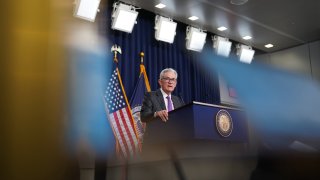
This report is from today's CNBC Daily Open, our new, international markets newsletter. CNBC Daily Open brings investors up to speed on everything they need to know, no matter where they are. Like what you see? You can subscribe here.
What you need to know today
A much-anticipated Fed hike
The Federal Reserve hiked by 25 basis points, taking rates to a target range of 5.25% to 5.5%, the highest since 2001. The much-anticipated hike was unanimous among voting committee members. However, Chair Jerome Powell left the door open to a subsequent rate hike, saying the central bank will make decisions "meeting by meeting."
Digesting new rates
U.S. markets reacted little to the Fed's rate hike. Still, major indexes were mixed, with only the Dow Jones Industrial Average rising for the 13th straight day. Asia-Pacific shares rose Thursday. Hong Kong's Hang Seng Index climbed around 1%, leading gains in the region. South Korea's Kospi advanced 0.44% even on the back of Samsung Electronics' 95% year-on-year plunge in profits.
Get top local stories in San Diego delivered to you every morning. Sign up for NBC San Diego's News Headlines newsletter.
Meta's quarters of efficiency
Meta's second-quarter earnings and revenue beat Wall Street estimates. Revenue rose 11% from a year earlier to hit $32 billion, the first time since 2021 the company's had double-digit growth. Meta's expected revenue in the third quarter is higher than analysts' expectations as well. That's all music to investors' ears (disregarding Meta's mounting losses in its Reality Labs unit). Meta shares rose almost 7% in extended trading.
BlackRock returns to India
BlackRock has teamed up with Jio Financial Services, an Indian company led by the country's richest man, Mukesh Ambani, to launch Jio BlackRock. BlackRock and Jio Financial Services each plan to invest up to $150 million in the 50-50 venture, which is BlackRock's second attempt to enter India's burgeoning asset management industry.
[PRO] What'll happen to the Dow's streak?
The Dow has risen for 13 straight days, its longest winning streak since 1987. The law of the market — what goes up must come down — suggests the streak will be broken soon. But that's not necessarily true, according to data analyzed by CNBC Pro.
Money Report
The bottom line
There was something for everyone at the Fed's latest meeting. At his post-meeting press conference, Chair Jerome Powell, in other words, deftly negotiated expectations from market bulls and bears, and somehow managed to reaffirm the case of both camps.
Market bulls will seize on Powell's comment that "it's possible that [the Fed] would choose to hold steady and we're going to be making careful assessments, as I said, meeting by meeting." That is, the two rate hikes left for this year — as suggested during the Fed's June meeting — might end up being just one. This implies that the Fed's at the end of its hiking cycle after this month's quarter percentage point raise. Supporting this thought is Powell's admission that the Fed "can afford to be a little patient" in seeing the effects of tighter monetary policy flow through the economy.
But there was much for market bears to chew on, too. Powell stated plainly that he doesn't think the Fed will be comfortable cutting rates this year — or even the next. "Policy has not been restrictive enough for long enough," Powell said. That means stocks will have to fight the tide if they want to rise further than they already have this year. But the Fed isn't that concerned about financial markets — it's even willing to endure "a period of below-trend growth and some softening of labor market conditions" because "the labor market remains very tight," Powell said.
All in all, it's a "hawkish hold," in the words of Frances Donald, global chief economist for Manulife Investment Management. The "hawkish" part will please the bears, while the "hold" portion will appeal to the bulls.
Markets had already priced in the hike, so they were muted. Treasury yields fell instead of climbing in tandem with interest rate rises. The S&P 500 was essentially flat, the Nasdaq Composite dipped 0.12% and the Dow Jones Industrial Average rose 0.23%. That gives the Dow its 13th straight day of wins, matching its longest winning streak since 1987. (For more on why the Dow seems to have such strong momentum now, read this piece by CNBC's Fred Imbert.) If the Dow rises in its next session, that'd be a streak not seen in 126 years (!).






